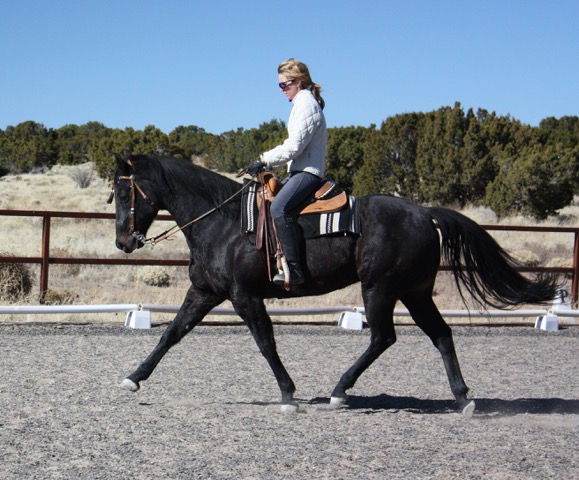
Bergfee Bo, the most talented horse I ever had the privilege to ride, made it look easy.
I’m a tough cowgirl and ultra runner with a domestic side I often ignore. Most of my friends don’t know that I like to cook, though I’m certainly no expert. In dressage terms, I’d say I’m at first or second level of the culinary scale: far from an FEI level chef, but no rank beginner either. I enjoy cooking in part because it's a more predictable activity than horse training. I love working with horses, but after riding five or six of them, it's relaxing to come home and make dinner. Food behaves the same every day. Eggs never refuse to scramble. Pasta always goes well with tomatoes and garlic, not just on some days.

In spite of this, I am learning that cooking and riding are a lot more alike than I used to think. Good riding is like cooking a good stew: it looks and sounds simple, but it’s a lot more complicated and takes a lot longer than it seems. Like a good stew, a well-trained horse is made from some key ingredients, most of which you get from the training scale instead of the grocery store:
1. Relaxation

Pamina, relaxing at the free walk.
Relaxation is like a good-quality cooking pot. It’s essential, but it’s also easy to overlook just how important it is until it goes missing. You can't cook any stew without a pot. You can cook some version of stew in a makeshift saucepan that's too small or made from the wrong kind of metal, but it won’t be easy, and it will never taste as good as what you can make in a large, heavy-bottomed pot designed for the purpose. Likewise, a tense horse may be obedient because it fears the consequences of being anything else, but it will never a willing partner and happy athlete.
2. Impulsion

The work of Norman Thelwell
Forward energy is like water: there has to be enough liquid in the pot - otherwise, what you’re cooking will never be stew. But though forward energy is crucial, it's not enough. Without any other ingredients, you end up with a pot full of hot water, which is still not stew and never will be. Even worse, you can end up with a runaway horse, which is the equivalent of the messy puddle you get without a pot of relaxation to contain the liquid.
3. Connection, Suppleness, Straightness

Shakin in my Boots, dressage horse . . .
These are like your meat, beans, and veggies: they give your stew its character. They are also the most visible parts of your creation. Chicken noodle soup tastes just as delicious as beef burgundy, but it’s a different kind of delicious. There are heated arguments about which kind of stew tastes best, but all good stews have a lot more in common with each other than the hardcore fans of a particular stew tend to believe.

And western horse.
Like stew ingredients, your contact, suppleness, and straightness have to be high-quality and carefully prepped before they go into the pot. If you skimp here, you and everyone watching will notice. One moldy carrot can make a huge pot full of stew taste awful, just like a crooked but otherwise well-trained horse will never learn lateral movements correctly.
4. Collection

Collection makes half-passes beautiful.
Collection is like a blend of spices. Adding these to the empty pot before the other ingredients is pointless. Like adding spices, developing collection takes time, patience, tact, and skill. And like adding too much paprika or oregano, overdoing collection can undo some of the basic building blocks of horse training, which a good rider then needs to rebuild. Good cooks spend much of their time dicing and stirring, like good riders spend most of their time in the saddle working on the basics.

Establishing trust is part of the basics.
In addition to these ingredients, cooking a good stew takes time and patience, just like a well-trained horse takes years to develop. A skilled cook knows that bouillon cubes or canned chicken broth can't replace home-made stock, no matter what it says on the package. A skilled rider will not use shortcuts like draw reins, super tight nosebands, or gimmicky bits. A good cook will not get in a hurry, turn up the heat, and risk burning the stew, just like a good rider will know that angry outbursts are counterproductive, and that the quiet, slow way of training is ultimately faster.
Lots of amateur cooks master the basics, but few become expert chefs because good cooking is more than following a recipe exactly as it is written. It takes intuition and creativity, without ignoring the basic framework of physics. Great horse-humanship, like really good cooking, takes the same type of intuition and creativity - in addition to, not instead of, solid skills developed over years of education and experience.

Expert cooks out there - feel free to disagree with my analogy. Where does it fall apart? What did I forget?
Happy riding,
Katrin
Comments